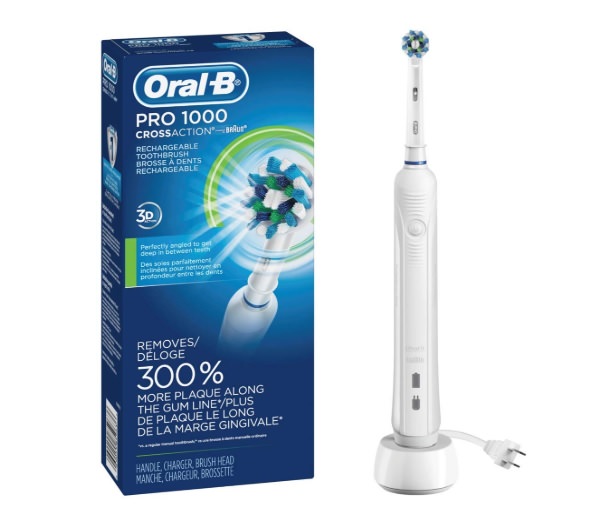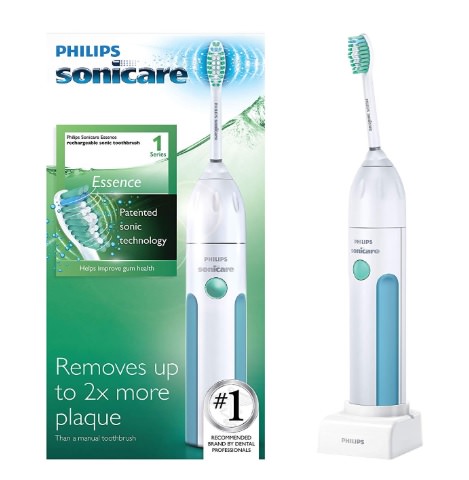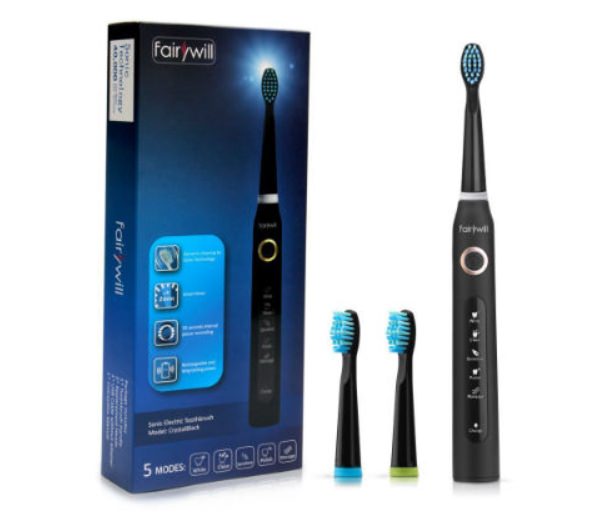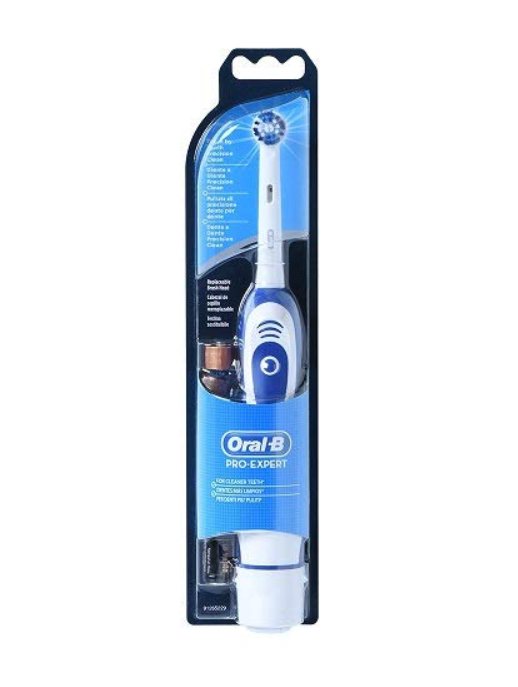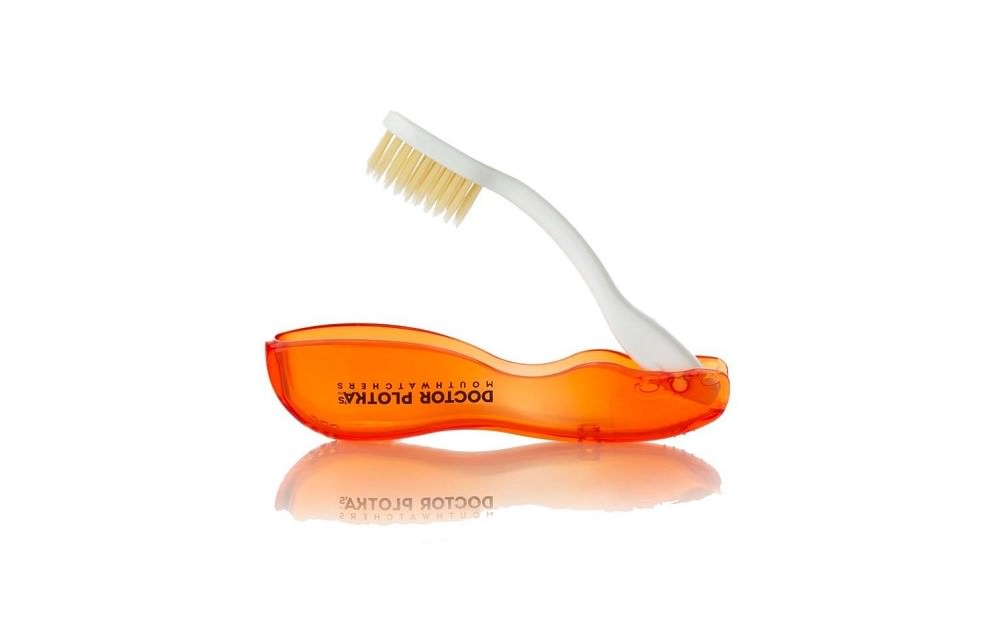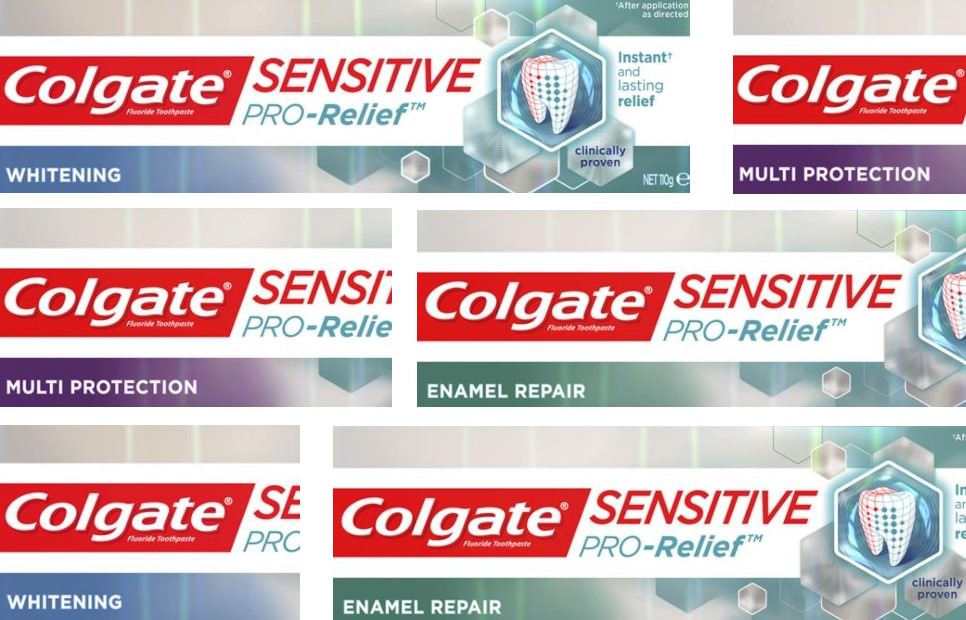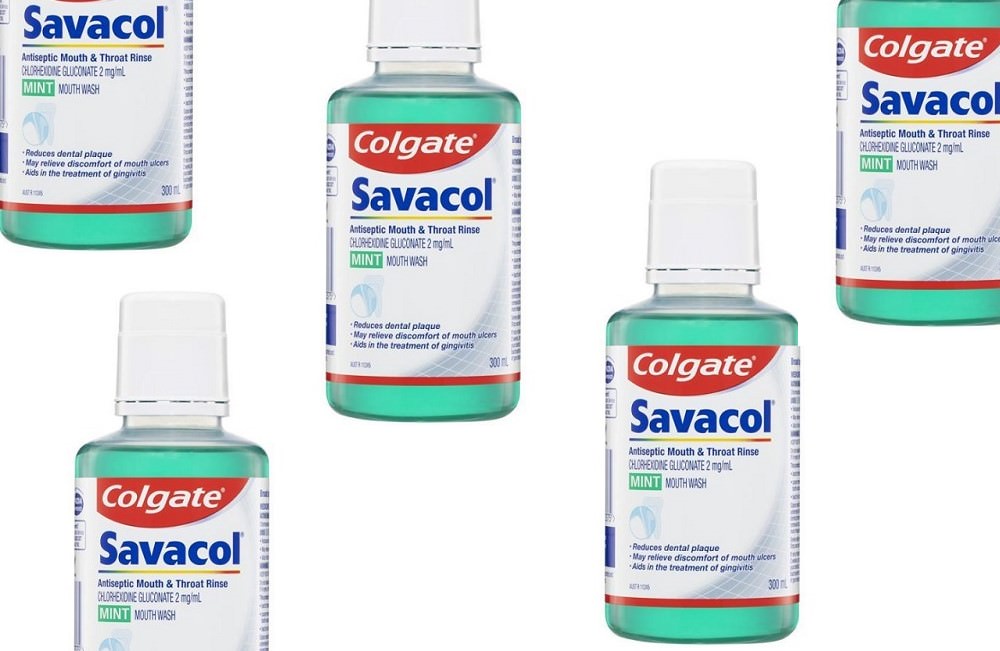Should You Use an Electric Toothbrush?
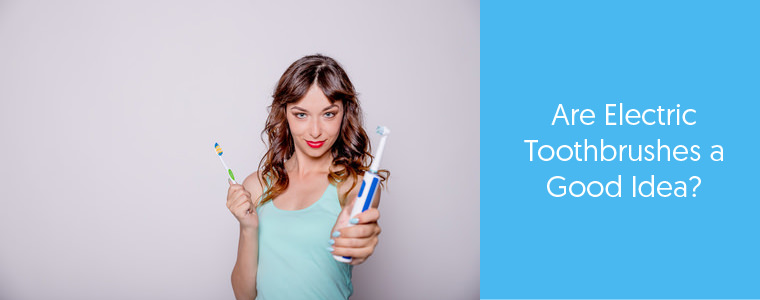
A debated question: Should you use an Electric Toothbrush?
The Answer: You don’t necessarily need one is the truth. A Manual toothbrush if used correctly will do a perfectly fine job of clearing away debris and ‘mushy’ plaque from in and around your teeth and gums.
But we humans love technology and some of the new electric toothbrushes available are quite amazing!
If you love technology, then maybe you’ve been wanting to test out an electric toothbrush to see if it would benefit you?
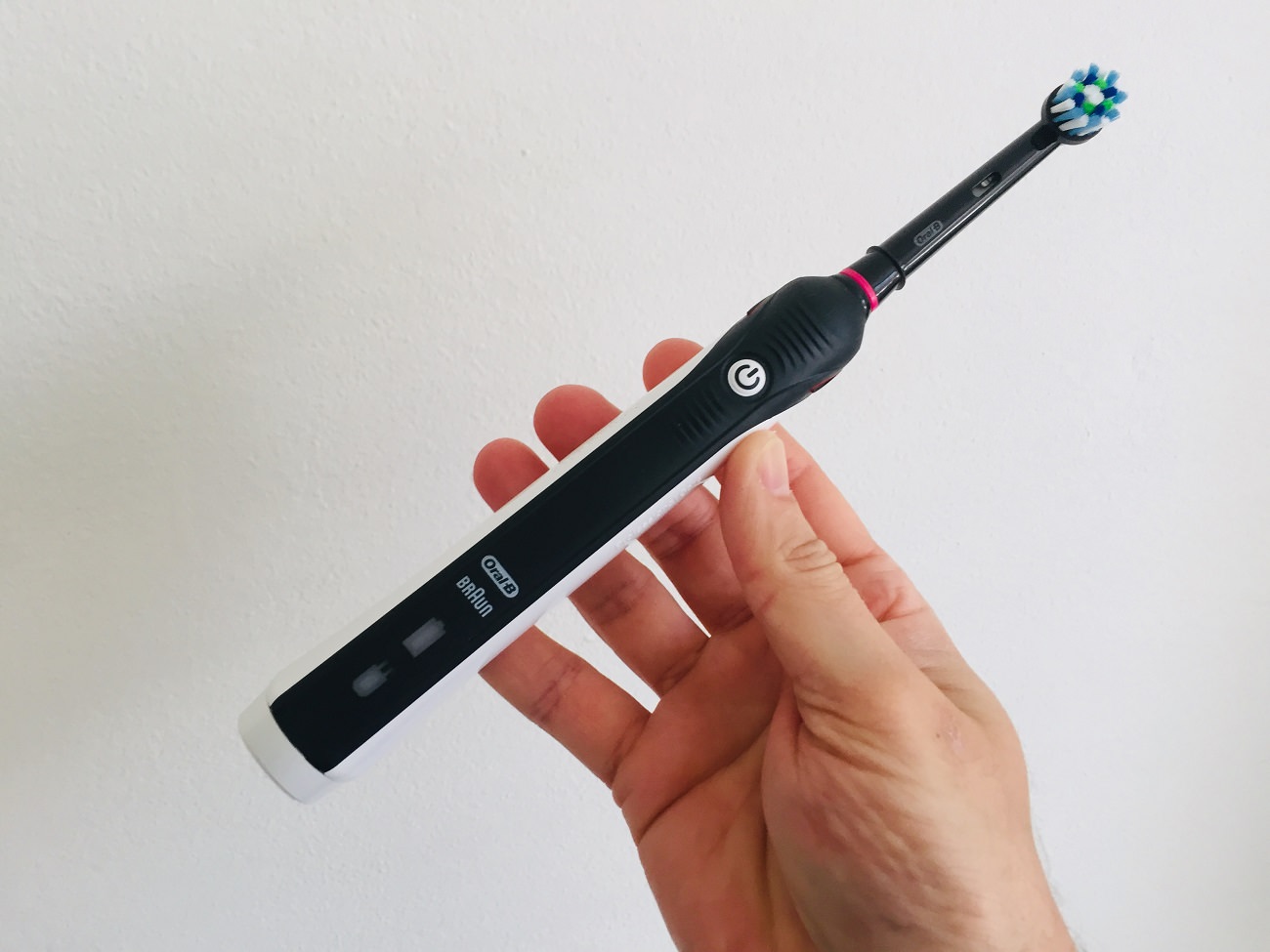
The Oral-B Pro2000 Electric Toothbrush. Recently review and tested at Dental Aware.
These new-age toothbrushes do have their advantages. Did you know that electric toothbrushes can clean your teeth easier because of their extra rotations?
Within the same amount of time, an electric toothbrush can effectively remove plaque, just like a manual toothbrush.
With pros, there also comes cons, but we’ll get to that in a bit. This article will cover topics such as;
• The advantages and disadvantages behind an electric toothbrush
• What to look for in an electric toothbrush
• Whether an electric toothbrush is suitable for you
• Some of the best electric toothbrushes on the market in Australia in 2019
You can use our Jump to Contents to navigate to a certain part of the post below.
Let’s jump into it!
Do I Actually Need an Electric Toothbrush?
Not everyone needs an electric toothbrush, it is a luxury item at the end of the day.
Kimberly Harms, DDS, a spokeswoman for the American Dental Association, says that “regular toothbrushes get the job done when you have the proper technique and use them the right way.
The only problem is, a lot of us don’t use them the right way – that is, for the necessary 2 minutes, with the correct motion and pressure, or with a little skill to get every hard-to-reach spot within that mouth of yours”.
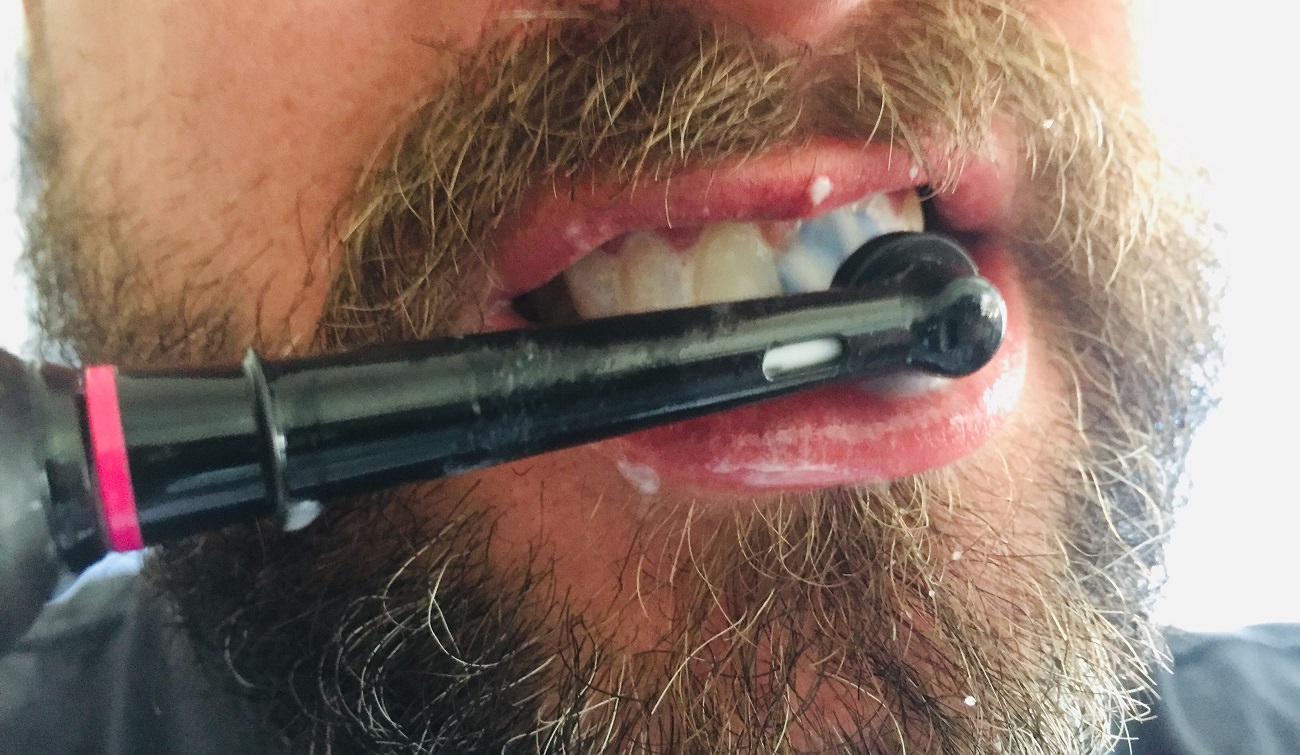
Electric toothbrushes do have their advantages.
An electric toothbrush can cover a larger area faster, so you clean more surfaces in the same amount of time.
When you brush with a manual toothbrush, you make about 300 strokes per minute – whereas using an electric toothbrush, you can make thousands up to tens of thousands of strokes per minute.
The purpose of an electric toothbrush is to move in a way that your hand cannot – thus making the whole process easier for you.
If you struggle with a manual toothbrush, an electric toothbrush if used properly can remove your plaque without scratching the enamel on your teeth and provide you with proper, quality toothbrushing.
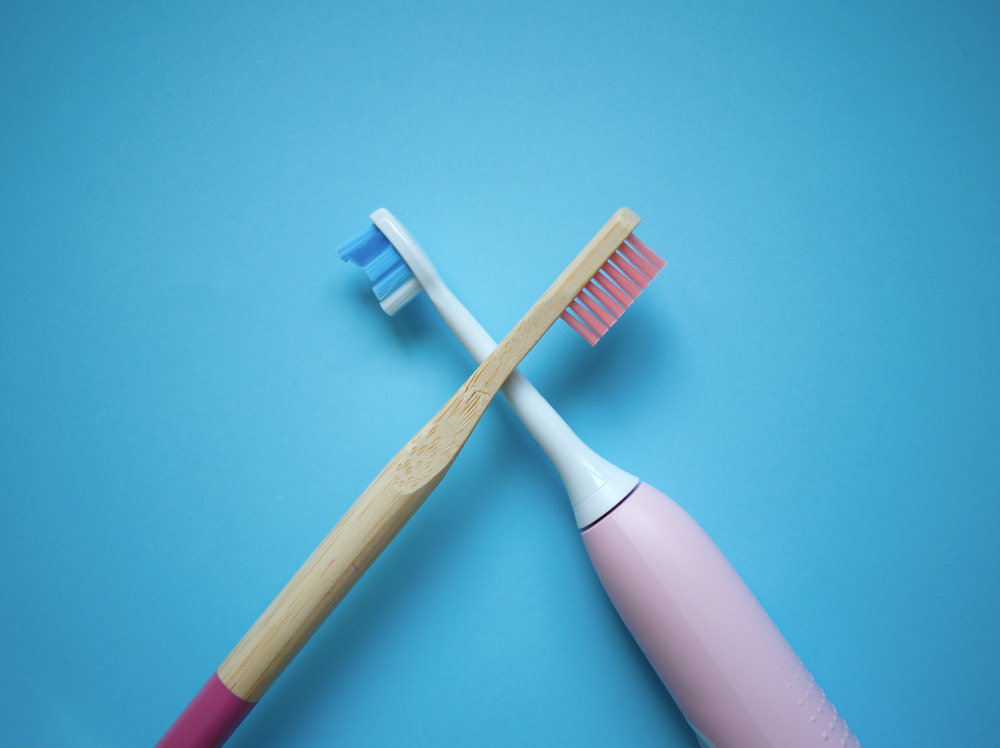
Electric Toothbrush vs Manual Toothbrush – Pros and Cons
There are numerous advantages and disadvantages with both types of toothbrush.
Depending on your budget, sensitivity levels and need for technology-rich products, some of the points below will resonate with you.
Advantages of an Electric Toothbrush
A manual toothbrush still has the ability to do everything an electric toothbrush can. This must be stressed.
However, there are some additional benefits from the assistance of an electric toothbrush. These include;
People with a Build-up of Plaque
The main advantage of electric toothbrushes is that they are more effective at removing plaque.
A study by Cochrane Systematic Reviews showed that after 3 months of use electric toothbrushes removed plaque by 21%.
People who Brush Too Hard
It’s can be easy to know if you’re brushing too aggressively when using an electric toothbrush.
Some of the more advanced electric toothbrushes have a built-in function to stop the device if you press too hard. A great function to be sure!
When this occurs, I should start brushing more gently as you are at risk of scratching the enamel on your teeth.
People with Limited Mobility
People who have trouble using their hands will find it easier to reach into the deep crevices of their mouth, such as those with;
- Carpal tunnel
- Arthritis
- Developmental disabilities
People with Orthodontic Appliances
A study done showed that electric toothbrushes were better for those with orthodontic appliances such as braces, as it made brushing easier, especially for cleaning in and around the metal parts.
People with Gum Disease
Those with gingivitis, periodontitis or even gum recession will benefit from the gentleness and safety of an electric toothbrush.
A study showed that after 3 months of use, gingivitis was reduced by 11%. The removal of plaque will also help prevent this from becoming an issue for you in future.
People who Want a Whiter Smile
If you love your coffee, red wine, or are a smoker, the proper use of an electric toothbrush can be effective at removing light stains.
You can also choose a toothbrush with various settings specifically designed for what you want to concentrate on.
For example, if whitening is an issue for you, many electric toothbrushes now come with that as a setting.
Lazy Brushers
If your Dentist thinks you’re not removing enough plaque with your manual brush, or not getting to all those hard-to-reach spots, they may recommend you use an electric toothbrush.
Multi-Taskers
As brushing becomes part of our daily routine, you may find yourself multi-tasking whilst brushing.
It’s quite common to find yourself performing a chore outside of the bathroom while brushing your teeth.
If you’re a multi-tasker, the automation of an electric toothbrush can help ensure you clean every surface.
Untimely Brushers
An electric toothbrush with a built-in timer can ensure you brush your teeth to the sufficient 2 minutes as recommended by Dentists – long enough to remove plaque from your teeth and gums.
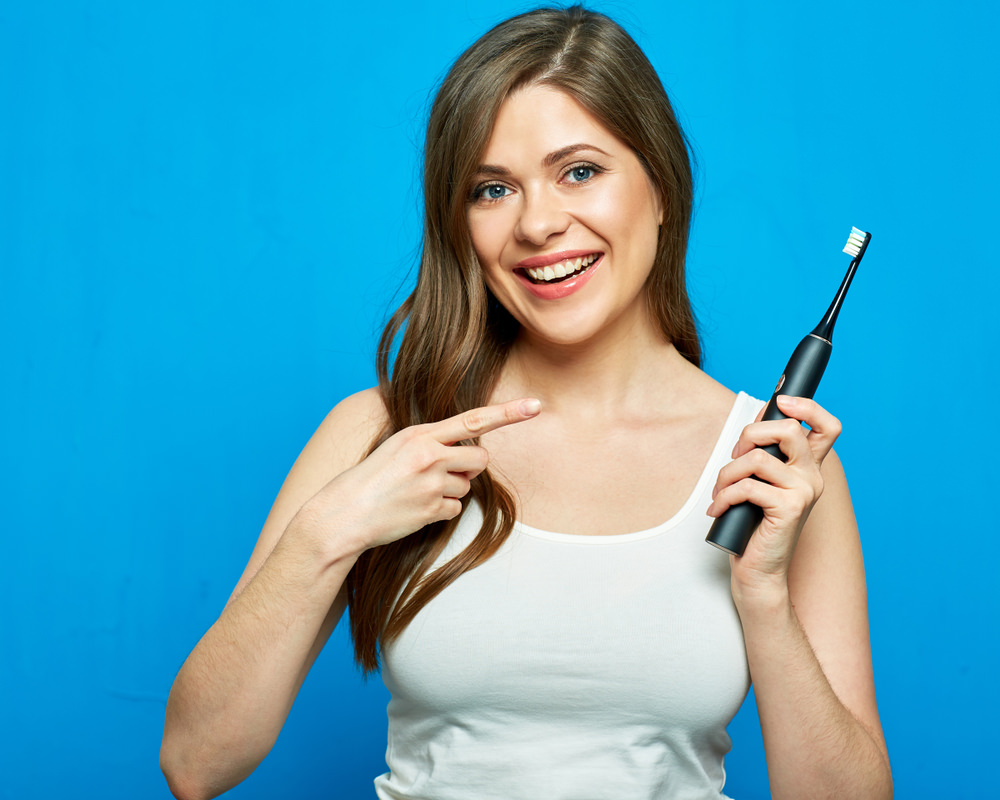
Disadvantages of an Electric Toothbrush
Electric toothbrushes do come with their disadvantages too. These include;
Over-Brushing
With an automatic dental device such as an electric toothbrush, it can be easy to over brush. You can wear away your enamel by brushing too hard as well as too much.
If you choose to use an electric toothbrush, find one with a pressure function so it stops when you push too hard. This will save your teeth.
The Cost
Probably one of the biggest disadvantages is the money factor.
Manual toothbrushes usually set you back between $2 to $20 dollars. But opt for an electric toothbrush you can find yourself spending $100 or more!
You also have to consider brush heads that will need to be replaced as often as manual brushes, too. Replacing the heads every six to eight weeks at the price of $10 to $75 each can be quite costly.
The Convenience
Finding the right replacement brush heads isn’t always easy. Not all stores sell them, so your local store might not have the brand you need.
You can purchase them online, but you must remember to do so in advance.
Another option is to stock up and have enough in the cupboard to last you a year – but this will add to your additional costs upfront, but will save you in the long run.
The Size
Electric toothbrushes are bigger and bulkier, which makes them harder to fit in your toiletry-bag and on your bathroom sink.
The plug-in versions also might not be a good idea if you’re planning on travelling overseas.
The Feel
Not everyone likes the vibrating feeling of an electric toothbrush, it can cause sensitivity issues. My parents are a fine example of people you just can’t stand the feeling of it. Almost ‘too full on’ was the expression used.
They can be also heavy and unbalanced while in the palm of your hand.
The Distraction
All the additional extras of an electric toothbrush, such as Bluetooth connectivity, or its multiple settings, may actually distract the user from proper brushing techniques, thus not creating better dental health.
All it is creating is a false sense of achievement – you may feel as though you are brushing better because of the amount of money you just spent on the toothbrush.
In this study among seniors, electric toothbrushes didn’t actually remove a more significant amount of plaque than a manual toothbrush.
This isn’t to say that the electric toothbrush does not work, but just that for some people, they may not be worth the money.
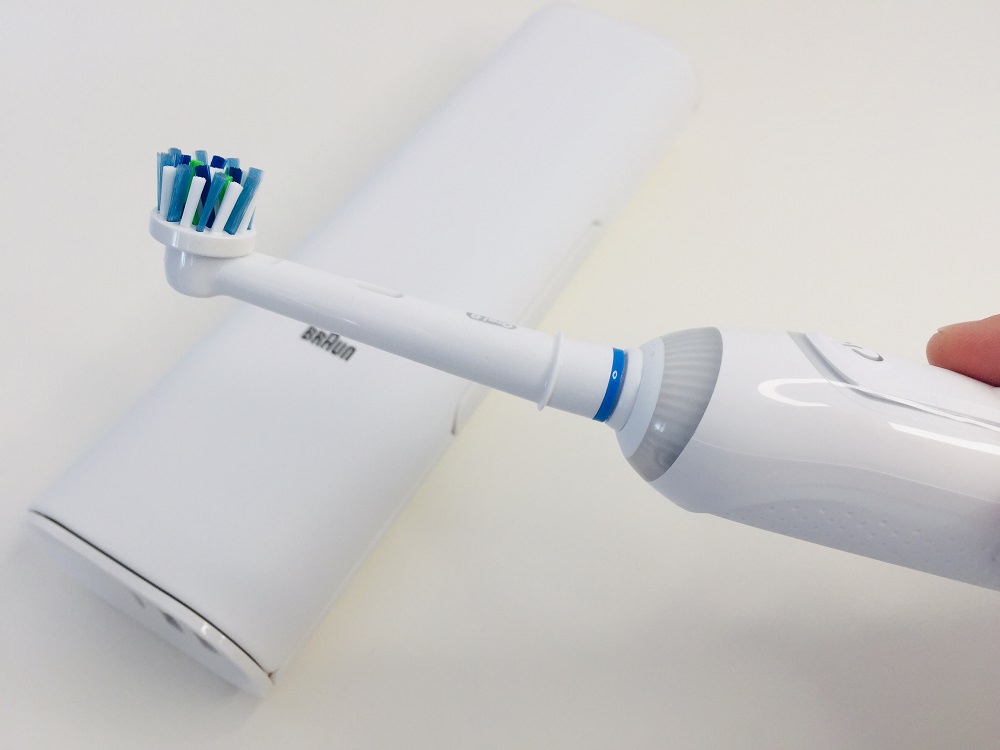
The Oral-B Genius 9000 Electric Toothbrush
What Makes a Good Electric Toothbrush?
When deciding on an electric toothbrush, you should take into consideration;
Plaque Removal
The main job of an electric toothbrush is to remove all the plaque from your teeth and gums.
You can ask your Dentist for a “plaque score” at check-ups – this will compare the levels of plaque on your teeth between each appointment.
Also, just judge yourself by the feel on your teeth after brushing.
Type of Motion
There are a few different types of electric toothbrushes, which we’ll discuss in further detail under “What Type of Electric Toothbrush is Most Suitable for Me?”, but the most common are sonic vibrations and oscillatory (rotary) motions.
People over 40, or with receding gums, will benefit from a sonic brush.
People under 40, with no gum recession, are usually more concerned about whitening and will benefit more from an oscillating brush.
Length of Life
Most rechargeable toothbrushes should last 2 weeks before they need recharging.
Those that are battery-operated should last a few weeks as well – basically, long enough for you to take a weeklong holiday without needing to take a run somewhere to buy new batteries!
Head Size and Shape
The size of your toothbrush head is very important in being able to access those hard-to-reach areas, such as between your cheeks and molars.
Anything too bulky will lead to areas being missed, so smaller is better.
Bristle Quality
The bristles are what is contacting your teeth, so they should be good quality.
A bristle made of cheaper material will wear down too fast, become too sharp, and scratch your enamel.
Built-in Timer
A handy feature that many electric toothbrushes have is a timer to let you know when to stop brushing your teeth.
Pressure Sensor
Many brushes come with a pressure sensor, which is excellent for people who brush too hard, those with sensitive gums or any gum disease.
The pressure sensor may even slow down the rotation of the brush if you are pushing too hard.
As you can see, electric toothbrushes have many different qualities and settings, so it’s just a matter of deciding what you are looking for in a toothbrush and choosing the one you prefer.
- Ultrasonic – The side-to-side, fast motion creates vibrations that dislodge plaque.
- Ionic – The brush head doesn’t move. Instead, low electric current in the bristles attracts plaque.
Within these types, you may have brushes that also pulsate, moving in and out against the teeth. Even further, you can choose what style of brush head.
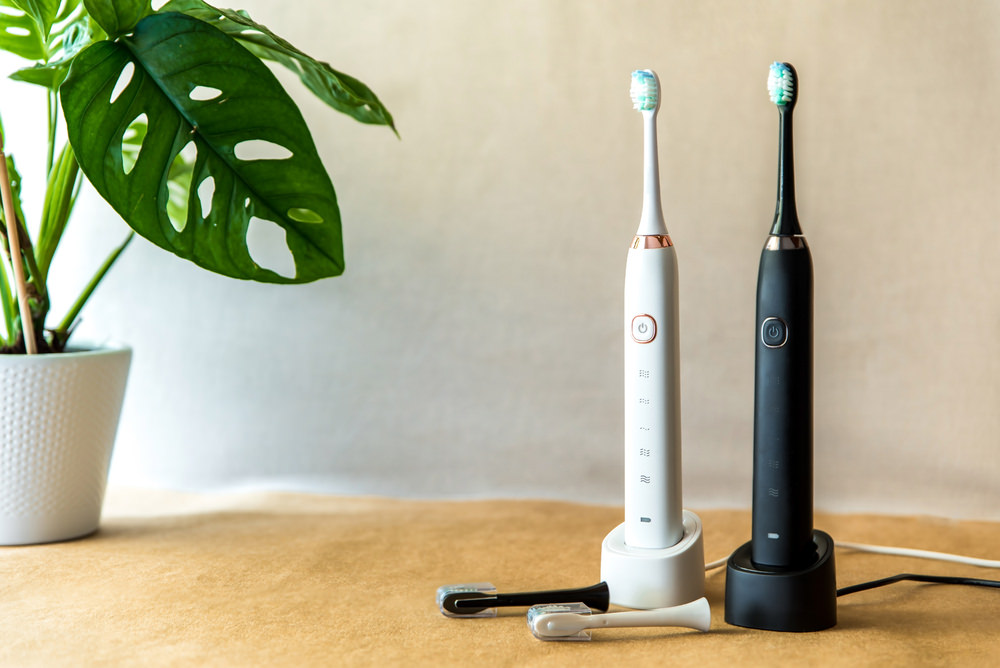
Which Type is Best – Manual or Electric?
Currently, there isn’t enough research to say for sure. This is because every individual is so different, it’s more important to choose a toothbrush based on your own needs.
However, for people under 40 years of age, a rotary toothbrush is recommended.
Oscillating heads tend to be effective at removing surface stains, and generally, people in this age group are more concerned with teeth whitening.
For people 40 years or over, or anyone with receding gums, a sonic brush is recommended.
The vibrations of a sonic toothbrush can help to dislodge particles of food and bacteria in the open spaces of teeth that are exposed due to gum recession.
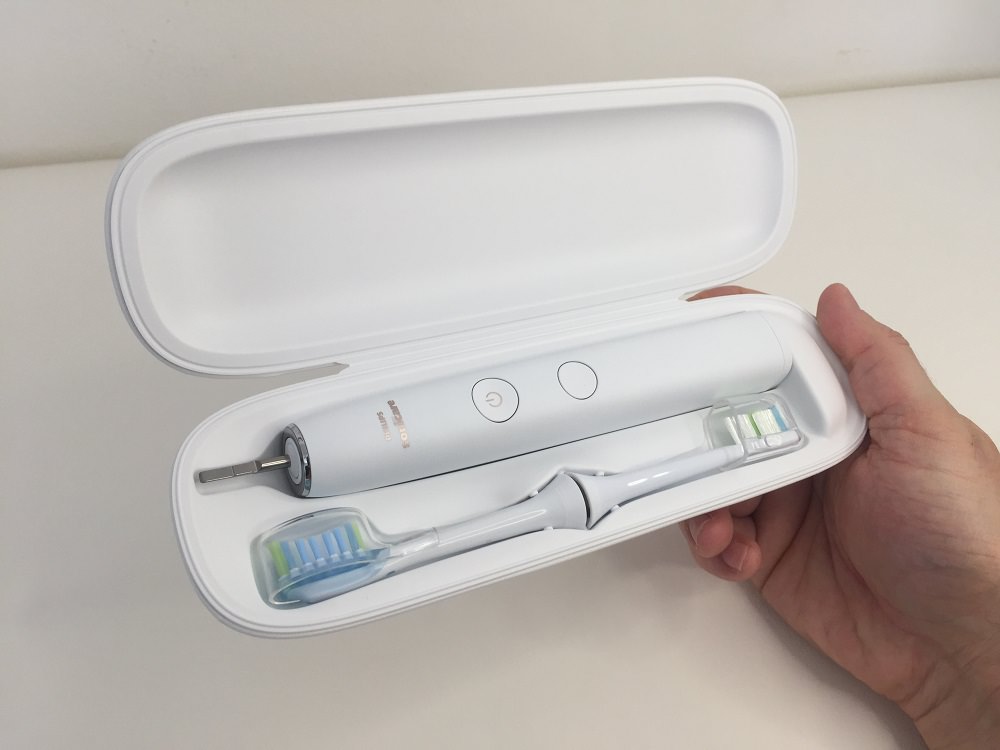
A compact yet feature-rich Electric Toothbrush by Philips – DiamondClean 9000
How Much Should I Spend on an Electric Toothbrush?
Disposable battery-operated brushes cost from $6 to $20. Their rechargeable electric versions range from $20 to more than $400 per brush.
Then you have their new replacement heads which generally come in packs and cost between $10 and $75.
So Why the Price Difference?
Well, some brushes come with travel cases, some come with built-in sensors that signal when you’re brushing too hard, some have built-in timers that beep every 30 seconds for 2 minutes to let you know it’s time to move on to a different part of your mouth.
High-tech versions have Bluetooth technology that sends data to your phone about your brushing habits.
You’ll find yourself paying extra for those with multiple settings – but it’s up to you to decide what you want out of a toothbrush, what you want to spend, and choosing what you prefer.
We’ve given you a range of some of the best electric toothbrushes below to contemplate!
What Type of Electric Toothbrush is Most Suitable for Me?
When it comes to types of electric toothbrushes, there are two main ones – oscillating (also known as rotary) and sonic.
Rotary and Oscillators
Rotating brush heads spin 360 degrees in a circular motion, at 3,000 to 7,500 strokes per minute.
A toothbrush where the head alternates directions is called rotation oscillation.
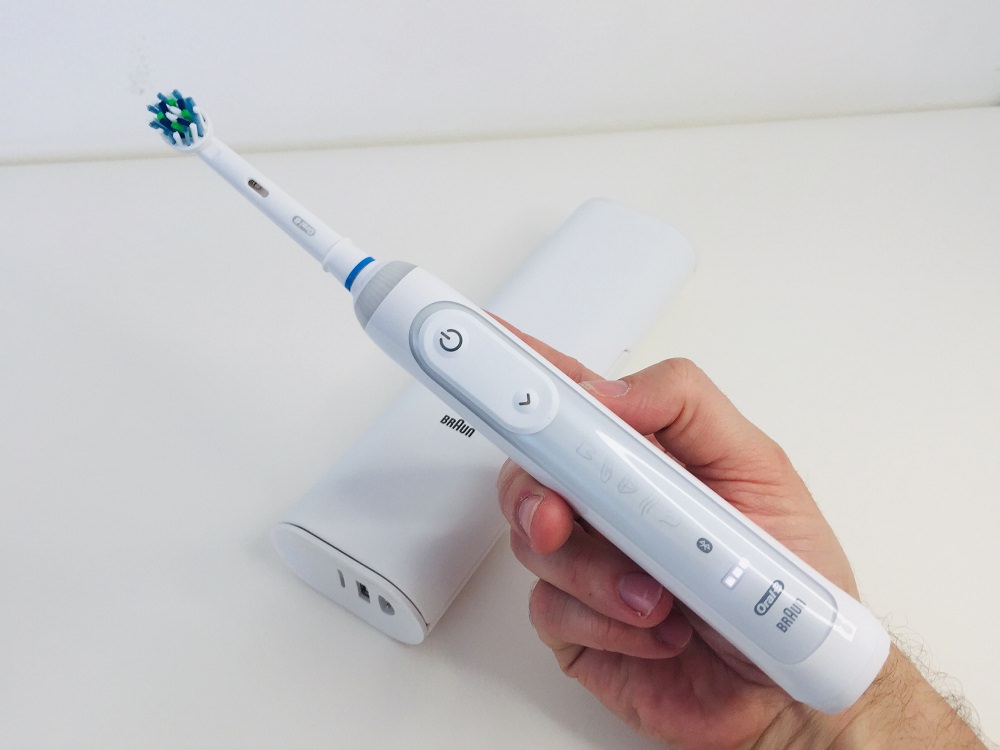
The Oral-B Genius 9000 has the rotation oscillation feature.
Sonic
These go back and forth and side-to-side, at a speed that is about 10 times faster than a rotary brush – roughly 31,000 brush strokes per minute.
There are also a few less common categories of electric toothbrushes.
The Best Electric Toothbrushes
Below is a selection of good quality and value for money options when it comes to electric toothbrushes.
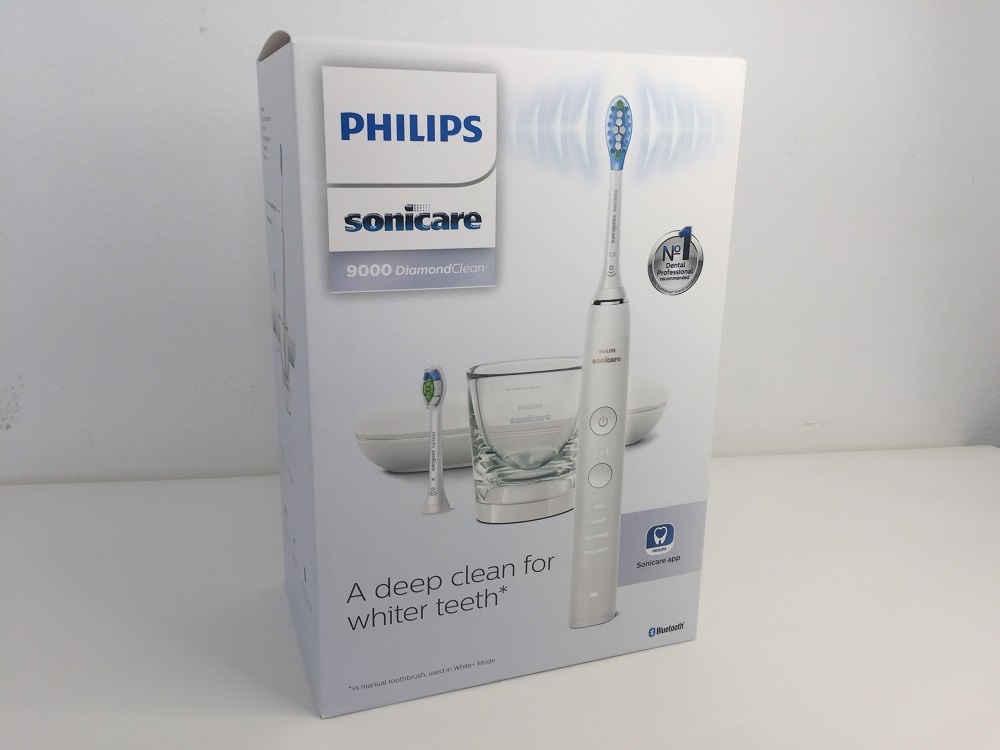
Philips Sonicare DiamondClean 9000 Electric Toothbrush
Brush – Philips Sonicare DiamondClean
Type – Sonic
Price – $279.00 – $379.00
Best For – Hygiene focused and Data Lovers
The Philips DiamondClean is kind of like the Mercedes-Benz of electric toothbrushes.
Along with the usual promises to whiten your teeth and protect your gums, it also comes with a deluxe USB travel case so you can charge on the go, a sleek charger glass that will sit stylishly in your bathroom, and a brush head holder for hygiene.
It’s also like your own personal Dental assistant – it syncs up with an app on your phone that can tell you which side you’re brushing more than the other, and tells you other ways in which your brushing style could use a little improvement.
Clinically proven to remove up to 7 times more plaque than a manual toothbrush after just four weeks of use, its settings include;
- QuadPacer – Advises you when you’ve spent the optimal amount of time on each part of your mouth.
- Smartimer – Lets you know when your total brushing time is up.
- Clean mode – For high-quality cleaning.
- Gum Care – Gently massages your gums.
- Polish – Brightens your teeth.
- Sensitive – Gentle yet effective cleaning for those with sensitive gums.
- White – Removes surface stains.
Now in all honesty – no one really needs a brush that costs this much or has so many features.
But some people love data and this brush definitely delivers! And there’s no need to worry – you still get two weeks of use from a single charge.
So if you’ve got the money to spend and feel like spending it on a toothbrush, this is an excellent choice.
I reviewed this product recently and you can see what I thought of the product – Philips Sonicare DiamondClean 9000 Electric Toothbrush.
Brush – Oral-B White Pro 1000
Type – Rotary
Price – $149.94
Best For – Under 40’s
Everybody knows the name Oral-B, so you can guarantee you’re getting a quality deal.
Their Pro 1000 toothbrush rotates, oscillates, and pulsates – all that cleaning is going to get rid of all that plaque stuck in your teeth, and quick!
Whilst this brush may not have all the settings of the more expensive versions, it still has every feature necessary;
- A pressure sensor that lights up when you brush too hard.
- An in-handle timer, which pulses every 30 seconds – this is to let you know when to switch spots in your mouth.
To see over 7000 reviews visit Amazon.
Brush – Philips Sonicare Essence
Type – Sonic
Price – $110.00
Best For – Over 40’s
The Philips Sonicare Essence will last two weeks before needing a recharge. It comes with all the necessities;
- A 2-minute Smartimer to ensure you brush thoroughly.
- The soft, contoured bristles start to fade to let you know when you should replace the brush head.
- Patented sonic technology to remove plaque in those hard-to-reach areas.
Check out over 6400 reviews at Amazon.
Brush – Fairywill Electric Toothbrush
Type – Sonic
Price – $29.99
Best For – Over 40’s on a Budget!
Get powerful cleaning with up to 40,000 micro-brushes per minute with the Fairywill Electric Toothbrush!
For a lower price, it has maximum benefits, including;
- A built-in timer that pauses every 30 seconds to remind you to change spots.
- You can charge it with your USB phone charger if on-the-go.
- 5 Modes to suit different conditions – White, Clean, Sensitive, Polish, and Massage.
- 55-gram extra-lightweight design – less than half of regular electric toothbrush.
64% of people who left a review gave it 5 stars!
Brush – Braun Oral-B Advance Power
Type – Battery Operated
Price – $19.99
Best For – Overseas Travellers
The Braun Oral-B Advance Power is a single-setting brush with no frills.
In comparison to the other brushes, it may not have all the ‘bits-and-bobs’, but it still gets the job done! Gentle on the wallet and battery-operated, it’s a great choice for overseas travellers and even kids.
See 12 reviews at Amazon.
As you can see from this range of toothbrushes, there are a lot of different settings, features, and combinations you can choose from.
There’s no “best” electric toothbrush – there’s just what’s best for you.
Conclusion
So, while we’ve discovered that electric toothbrushes are not a necessity, they can definitely be helpful.
They can help you remove all the plaque from that spot that you’ve missed.
If you use an electric toothbrush with a pressure function they can help to tell you if you’re brushing too hard.
Still, when buying an electric toothbrush, you must remember to take into account that you must maintain a good dental care regime, such as brushing your teeth twice daily and replacing the toothbrush head every 6 to 8 weeks.
All these things are still going to be far more important for the health of your teeth and gums than the money you spend on an electric toothbrush.
Having taken all of that into account, the best electric toothbrush you can purchase is the one that you are going to love, that you will use consistently, and with which you will still maintain the proper brushing technique.
Because there is no “best” electric toothbrush, there is just what is “best” for you and your needs.
Sources
• https://www.aso.org.au/electric-or-manual-toothbrush
• https://www.webmd.com/oral-health/features/electric-toothbrushes#2
• https://www.ncbi.nlm.nih.gov/pubmed/8972810
• https://www.cochranelibrary.com/cdsr/doi/10.1002/14651858.CD002281.pub3/full
• https://www.ncbi.nlm.nih.gov/pubmed/2503957
Is there a particular toothbrush you like using? Leave a comment below and let us know!
By Andrew Adams
Created at October 25, 2019, Updated at January 25, 2025


